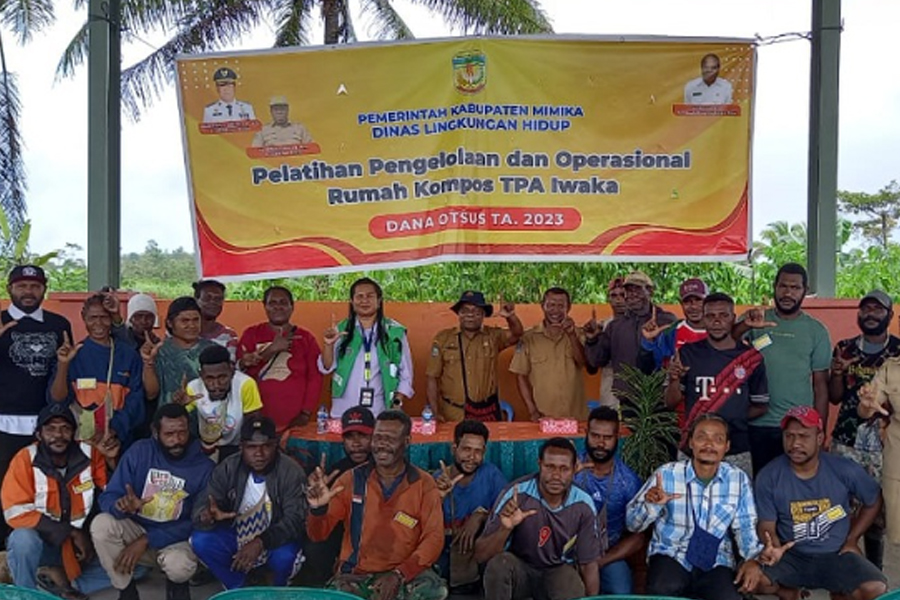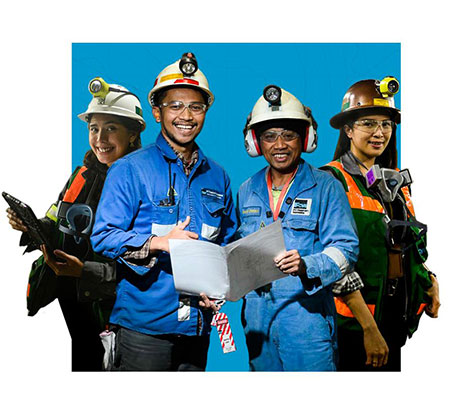28 August 2023

Jeffri Deda said processing organic waste into compost is one of DLH's programs funded through the Special Autonomy (Otsus) budget post. Therefore, the training participants were prioritized for Indigenous Papuans (OAP). Thus, the Special Autonomy funds can be direct use to them. "For almost 25 years, we have received Special Autonomy funds. In this program, we plan not to give fish directly but hooks and nylon, so residents can fish. With hooks and nylon, it lasts longer than being given fish; it runs out quickly," explained Jeffri.
He said the training results can be sold to the Department of Agriculture and distributed to farmers. DLH will also buy processed compost to add nutrition to flower plants along roads in Timika. The proceeds from the sale are returned to the residents to supplement the family's economic income. Jeffri explained that the waste management activity is a strategic program launched by the central government through the provincial and Mimika Regency governments, which aims to reduce the volume of waste.
Central government policy is regulated in Law Number 18 of 2012 concerning Household Waste Management, Regional Regulation (Perda) of Waste Number 11 of 2012, and Regent Regulation Number 36 of 2018 concerning Strategic Policy for Waste Management in Mimika Regency. Waste management must achieve two essential things by 2025: reduction and limitation. The government will make regulations so that shopkeepers and supermarkets reduce the use of plastic. It is a policy that the government must implement. "However, the government has only arrived at the Garbage Regional Regulation. We do not yet have a Regional Regulation on limiting the use of plastic waste. In the future, there must be one," said Jefri.
Through training, Jeffri hopes that by 2024, the government will have found a market to absorb the compost produced at the Iwaka compost house. "Residents will making it, while the government will help find a market for it. The Agriculture Service must purchase the results of this compost," said Jefri. It is hoped that the Mimika Regent can issue a Regent Regulation (Perbup) to oblige technical OPDs to buy compost from the Iwaka Compos House and not to buy it from other areas outside Papua. Thus, the results of compost processing have value.
It is feared that one day, this business will stop because residents think what they are doing is in vain because they don't get outcomes. DLH is also building a processing site to reduce plastic waste this year. According to the plan, the processing site will be built at the former DLH Office on Jalan Cenderawasih SP2. Plastic waste can be reduced through processing facilities because it has been processed into finished goods, such as bricks, zinc and other necessities. "The program started by the Waste Sector can be continued so that existing programs do not disappear but continue to be sustainable. In this way, the government can achieve the government's target of reducing waste by 30-70 percent by 2025."
Meanwhile, Grace Kristina Pek, the resource person, said there are two types of waste: organic and inorganic. Organic waste is produced from biological materials and can be degraded by microbes or biodegradable due to human activities. This waste can quickly decompose through natural processes.
She gave examples of food waste, vegetables, fruit peels, leaves and twigs. Then, inorganic waste is a type of waste generated from synthetic products and the results of technological processing of mining materials that are difficult to decompose, such as plastic waste, aluminium, styrofoam, glass, ceramics and detergents. The problem is the segregation of waste from minimal sources, which makes all the waste mixed, making it difficult for the management process. As a result, all waste is buried in Temporary Storage Sites (TPS) and Final Disposal Sites (TPA).
Kami menghimbau para pencari kerja untuk berhati-hati dan mewaspadai beragam modus penipuan perekrutan yang mengatasnamakan PT Freeport Indonesia. Dalam setiap proses rekrutmen dan penerimaan karyawan, PT Freeport Indonesia maupun konsultan rekruitmennya tidak memungut biaya apapun.
Untuk melihat lowongan, silakan akses melalui link berikut: ptfi e-recruitment
Untuk melihat informasi magang, silakan akses melalui link berikut: Internship Program
